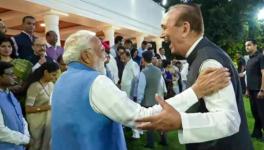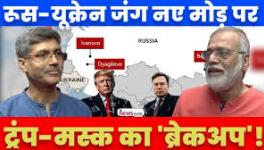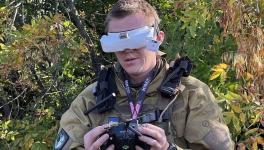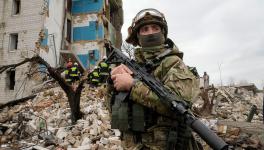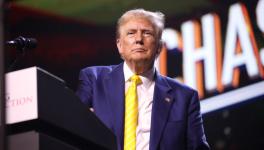Putin Recites Distribution of Power in Central Europe
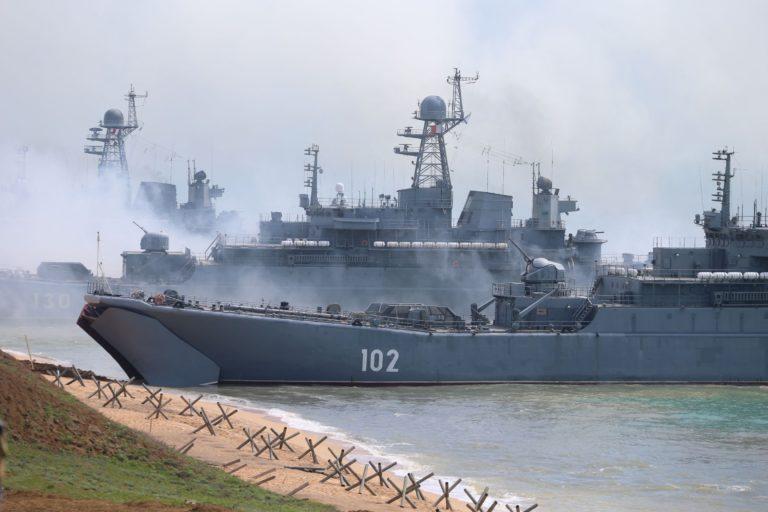
Russian military’s armoured vehicles roll into landing vessels after drill in Crimea, Black Sea, April 23, 2021
The Colossus in modern European history with whom Russian President Vladimir Putin would draw comparison might be Otto von Bismarck, the first Chancellor of the German Empire who unified his country out of the scattered pieces. Putin is very familiar with German history, culture, society.
Such analogies would always have limitations, but the similarities are striking insofar as Bismarck and Putin share an innate conservatism and immutable belief in a God who agreed with them on all issues and a zeal to defend the existing social and political order in order to prevent a Hobbesian chaos of all against all — and, yet, they cannot by any reckoning be seen as backwoods reactionaries, either, out of touch with the dynamic forces of their turbulent eras.
Thus, it is important to understand the seemingly routine statement by Russian Defense Minister Sergei Shoigu last Thursday announcing the decision to wrap up the Russian troops’ surprise combat readiness checks in the Southern and Western Military Districts. There was much speculation in the West that a Russian invasion of Ukraine was in the cards.
Therefore, Shoigu’s remarks came as a bit of anti-climax, creating confusion and mood swing in the West. However, as the dust settles down, the West is grudgingly realising that Putin has brilliantly outmanoeuvred the US and NATO. The paradox is that the fears of an imminent Russian invasion, stoked by the large build-up of forces on Ukraine’s eastern border and additional forces sent to Crimea, also generated a sense of realism in the western mind that neither the US nor NATO is in any position to go to war with Russia for the defence of Ukraine.
Equally, Ukraine also has sobered up and realises that it is foolhardy to poke the Russian bear on the vague premise that the western powers would come to its help if push comes to shove. After hearing about Shoigu’s announcement, Ukrainian President Volodymyr Zelenskiy promptly wrote on his twitter account that he welcomed “any steps to decrease the military presence and de-escalate the situation in Donbas.”
Of course, the Russian build-up was unnerving. The estimates of troops vary from around 40,000 new troops largely stationed in the city of Voronezh, some 130 km from Ukraine’s border, to the European Union’s higher estimate of 100,000 troops. Analysts agree that this Russian build-up has been the largest since 2014.
Notwithstanding Moscow’s varying explanations of the deployment — that it was reacting to a build-up by Ukrainian troops in eastern Ukraine; that it was reacting to threatening behaviour by NATO forces; and, that the troops were simply on an unscheduled exercise — in the final analysis, it has turned out to be “a bit of geopolitical theatre designed to put pressure on Kyiv and at the same time send a very strong signal to Washington that Russia could, and would, cause a lot of trouble,” as an incisive western analyst noted.
Shoigu has ordered that the troop withdrawal should be completed before the traditional May Day festivities. To quote him, “By May 1, 2021, the personnel of the 58th Army of the Southern Military District, the 41st Army of the Central Military District, the 7th, 76th Airborne Assault and 98th Airborne Divisions of the airborne troops (will have returned) to their permanent deployment points.”
But then, Shoigu also decided that the heavy armour of the 41st Army will remain close to the border with Ukraine “in case something happens” until the Zapad 2021 annual large-scale military exercises due in September. Also, the 56 VDV brigade (Vozdushno-desantnye voyska Rossii or the Russian Airborne Forces) will stay in Crimea to reform itself into a regiment that will henceforth be based there permanently!
The Zapad (Zapad in Russian means “west”) is an annual military exercise which simulates Russian forces defending the motherland against attack from the West, the traditional invasion route, and involves the mobilisation of all the three main battle groups along the entire western front. Plainly put, it is a formidable display of Russian military might along its border with NATO to be duly noted in Brussels.
The pullback signifies Putin’s willingness to hold a summit meeting with the US president Joe Biden, as the latter proposed in a phone call recently. Meanwhile, Pentagon has given up its belligerent posturing by cancelling the deployment of two warships with cruise missiles to the Black Sea and UK too has apparently dropped its plan to send another warship to the Black Sea. Again, a diplomatic row with Moscow that was kickstarted by the US and British intelligence with Czech Republic as their surrogate also fizzled out with Prague washing its hands of it.
To cap it all, today, the Kremlin has thrown down the gauntlet at Washington, claiming it has “all the necessary proofs” regarding a coup attempt against Belarus president Alexander Lukashenka to overthrow the government and eliminate him physically.
The Biden administration has been left in no doubt that Putin has drawn new “red lines”, which should be taken seriously. In a major speech in Moscow on April 22, Putin said, “We really do not want to burn bridges. But if someone mistakes our good intentions for indifference or weakness and intends to burn down or even blow up these bridges, they should know that Russia’s response will be asymmetrical, swift and tough… I hope that no one will think about crossing the “red line” with regard to Russia. We ourselves will determine in each specific case where it will be drawn.”
What comes to mind is Bismarck’s practice of using radical means in the service of his own conservative ends. Onlookers were surprised when after the famous Battle of Koniggratz (1866), Bismarck disregarded the advice of the king and the opinion of his generals and ordered the Prussian Army not to storm Vienna. Bismarck was adamant that he was not after territorial conquest or the humiliation of Austria. Nor did he want to risk third party intervention.
Bismarck’s objectives were highly focused. And Europe took some time to realise that Bismarck had transformed the distribution of power in central Europe and that Austria, the dominant power in Central Europe for centuries, was reduced to secondary status.
Similarly, the massive Russian manoeuvring on Ukraine’s border and the Crimea in the recent weeks have underscored that Moscow has overwhelming military superiority to squash any foolish adventure by the Ukrainian authorities to change the status quo in Donbass or Crimea, but Putin wouldn’t deploy them in battles, as territorial conquest was not at all his objective; nor was he seeking a confrontation with the West.
The failure on the part of the Biden administration to recognise this geopolitical reality and the subtle shades in the emergent situation along Ukraine’s borders and the Crimea is “reflective of the suicidal hubris and arrogance that has gripped what passes for an understanding of modern-day Russia” in Washington, as Scott Ritter, a former US Marine Corps intelligence officer and author, wrote recently.
The French public resented the Prussian victory at Konniggratz and its demand for “revenge” formed part of the narrative that led to the Franco-Prussian War of 1870, which itself was caused primarily by France’s determination to restore its dominant position in continental Europe. Of course, historians cannot agree till this day whether Bismarck deliberately provoked the French into declaring war on Prussia or he merely exploited the circumstances as they unfolded. But strategic ambiguity has always been part and parcel of the repertoire of far-sighted statesmen.
At any rate, while Putin has stated that war is not his preferred option, he stressed that his “red lines” are not to be crossed, and that it is Russia who will determine “in each specific case where it will be drawn.” The distribution of power in central Europe has transformed.
Get the latest reports & analysis with people's perspective on Protests, movements & deep analytical videos, discussions of the current affairs in your Telegram app. Subscribe to NewsClick's Telegram channel & get Real-Time updates on stories, as they get published on our website.











